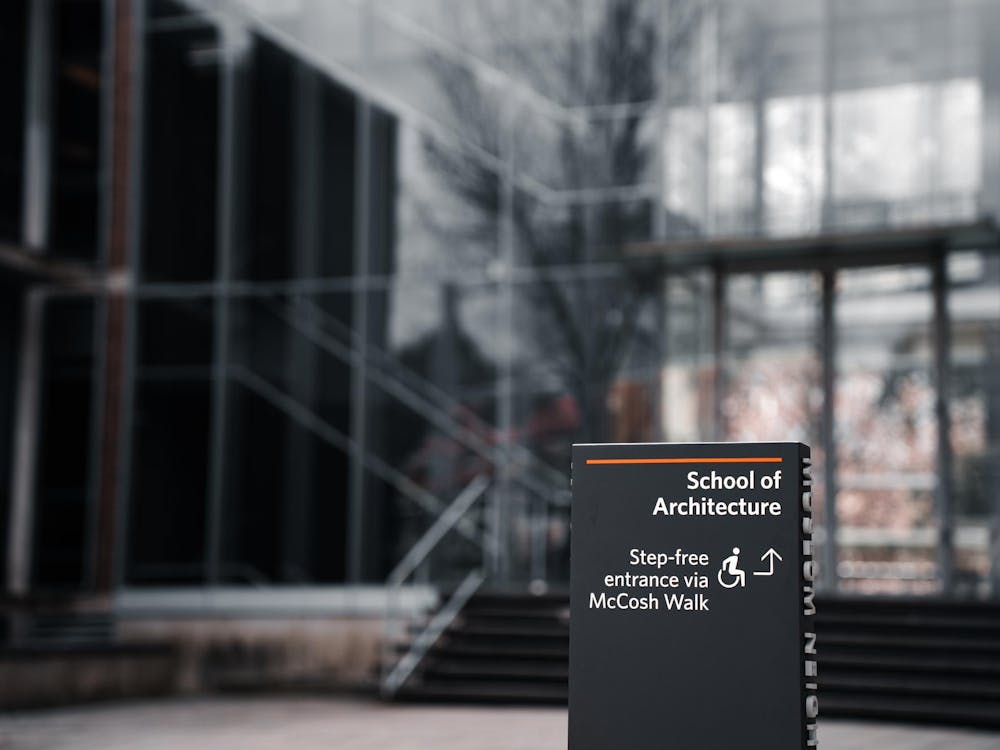Sprawled in one of Frist Cafe's enormous chairs, Ernesto Rivera is a friendly, middle-aged man. He is a talented musician, one of the founders of the Princeton Chicano Caucus, a father of seven children and grandfather of six.
He is also a successful Princeton undergraduate student. Rivera, a 43-year-old junior, jokes about locking himself away to read during spring break and, like any other student, complains about the amount of reading for his courses.
When Rivera decided to leave Princeton University during his third year in the 1970s, he never imagined returning 22 years later to complete his degree in politics.
"I just went on with my life. I didn't think I was going to be coming back," said Rivera. "I left and had an actual life."
Rivera, from El Paso, Texas, was originally admitted in the 1970s, when he was one of a handful Chicano students on campus. He immediately became active on the political scene at Princeton.
"I got very politicized back then," Rivera said. "And I got very, very involved in admissions and trying to increase our numbers . . . But I was more interested in doing that than in my schoolwork. It was something all-encompassing. I was trying to give more people the opportunity to come here."
As a sophomore, Rivera helped found the Chicano Caucus — a political organization designed to promote Chicano culture on campus.

"It is still here today, which is pretty cool," said Rivera. "It's not the same as it was. It has kind of become more social, which is fine. Back then it was really political. But then the times were more political. There were still a lot of ideas from the sixties . . . radicalism, that kind of thing."
Besides his political activism, Rivera joked that he was "probably in more musical groups than he'd like to admit." He was a trumpet player and a singer involved in the orchestra, the symphonic band, the jazz ensemble, the glee club, and his own mariachi band.
Then during his junior year, Rivera, then 21, got married. The new pressure, combined with his mounting academic struggles, finally did him in.
"It was really difficult," Rivera said. "We got married over Christmas break . . . and came over here for reading period and finals, so it was pretty stressful. As a result, it didn't work out."

After his wife returned to Texas, Rivera decided to take a leave of absence — one that would extend over the next 22 years.
"I wanted to take a leave before I was forced to withdraw," said Rivera. "I really wasn't doing well. I wasn't doing any of my work."
So Rivera walked away from the University, thinking he'd never return.
Rivera returned to his home state where he worked as a top-level supervisor for the Texas Employment Commission — a state agency that helps people find work. After several titles, Rivera took an early retirement and opened his own advertising agency specializing in radio spots.
Some time later, as a favor, Rivera agreed to teach choir temporarily at a rural school outside of El Paso. Within two months, the superintendent offered him a permanent position and a plan to earn his degree and teacher certification. Rivera closed his advertising agency and enrolled at the University of Texas, El Paso.
Unfortunately, the superintendent who originally proposed the deal moved to another district, and Rivera, not wishing to leave his family and move to that district, had to stop teaching until he legally received his degree and certification. He decided to continue his courses.
"I was going to go for three semesters, get my degree, and then go back into teaching."
Rivera successfully completed his first two semesters with virtually a 4.0 GPA. In December of 2000, with only one semester remaining, he suddenly received a letter from the UTX registrar's office saying that his degree would require five additional semesters.
"Everything from Princeton transferred over as upper-level courses, so I needed two years of basics to get my degree."
In frustration, Rivera called Princeton University about the possibility of returning and finishing three semesters he needed for his degree. He spoke with Dean Richard Williams who was a "godsend."
"Dean Williams told me what I had to do. I had to get transcripts from UTX and letters of recommendation, so I started getting this stuff done as quickly as I could," Rivera explained. "Next thing I know I'm on my way to Princeton."
Rivera is very happy to be on campus, but he does admit that the coursework is challenging and time consuming. As a politics major with a certificate in Latin American studies, he juggles this semester upper-level courses that include politics, sociology, religion, music and a second JP.
"My first JP was on the history of Chicano politics from beginning of time up to '77 [and originally] my second JP was going to be all theoretical and my thesis was going to be a combination of both of them," Rivera said. "[But] I come back 22 years later, and now there is 22 more years of history that needs to be analyzed before you can do anything. My JP this semester was looking at Chicano politics from '77 until now."
Reflecting on the difficulties of integrating into the student population, Rivera spoke about his experiences in class.
"I didn't talk much in precepts in the first three weeks of school because I did not want to feel like I was taking over," he said. "But each of my professors told me that I was part of the class and to join in. I was just one of the students, just like anybody else, and I appreciated that."
Rivera transformed from a mediocre student in the 1970s to a complete academic success in 2001. He is hoping to finish this semester with straight As.
Rivera is also dealing well with the difference in age and values between him and the other students. He is rooming in Spellman next year with three students who call him the "old-school Chicano."
"I'm going to school with a generation where my kids should be . . . Back then we were more interested in advancing our people, and now it's more like the "me" generation — which isn't bad," he explained. "It's just really different."
Rivera has not lost his political zeal. He believes that the admission board should give more consideration to recruiting inner-city Chicano applicants instead of concentrating on alumni children or students from "feeder" schools. He hasn't been as involved, however, in advocating his cause because he has been focusing on the academics. Next year, he plans to join the jazz ensemble and possibly the symphonic.
Though Rivera originally returned to the University with aspirations of becoming a teacher, now he has decided to attend a law school in Texas. Being in Texas is important in order to be close to his family.
"This semester was the first time that I was away from my little son on his birthday, and it killed me," he said.
Still, Rivera jokes about his readmission after so many years as a "great experiment."
"I think I'm kind of like a guinea pig," he said. "I don't know too many people who have come back after more than twenty years."







